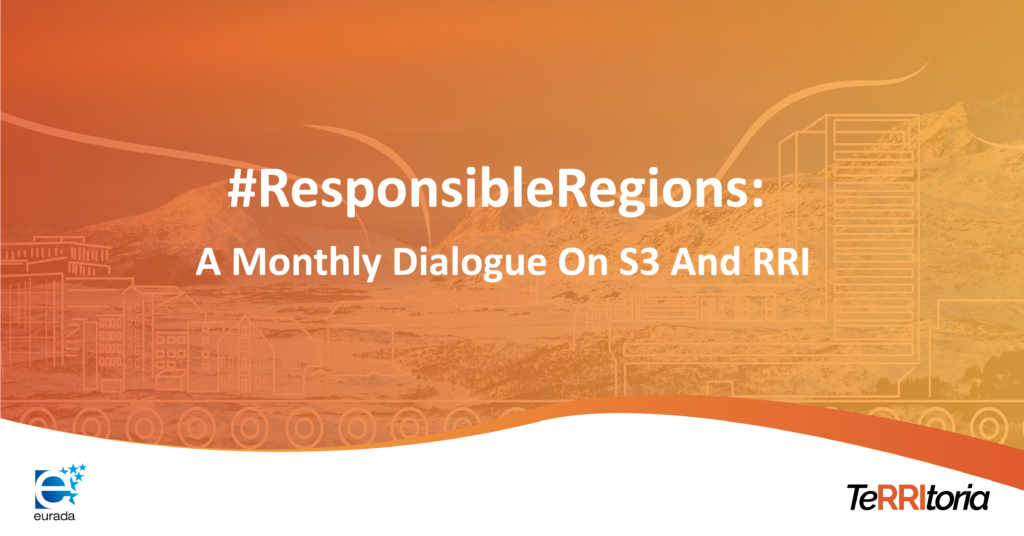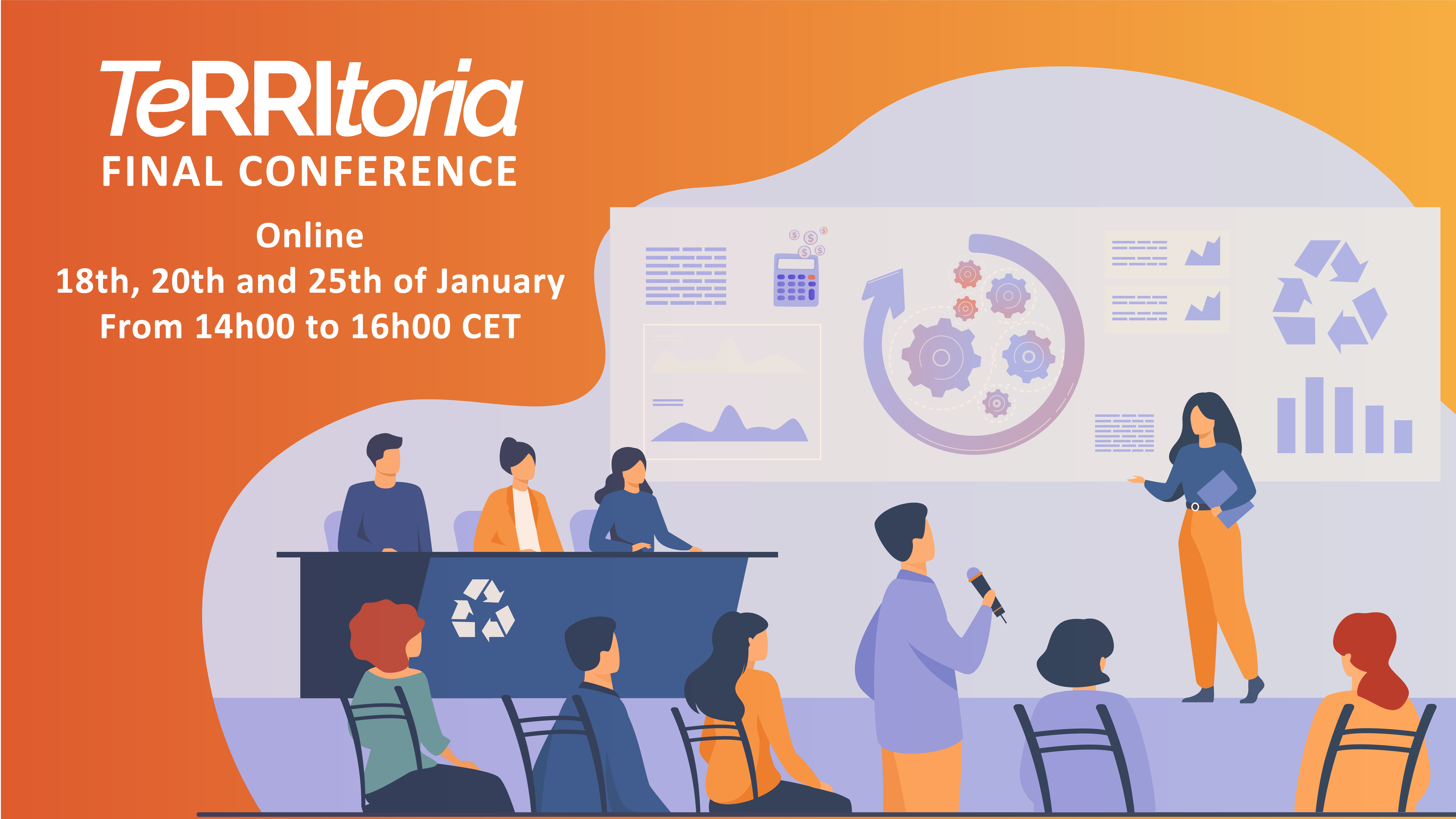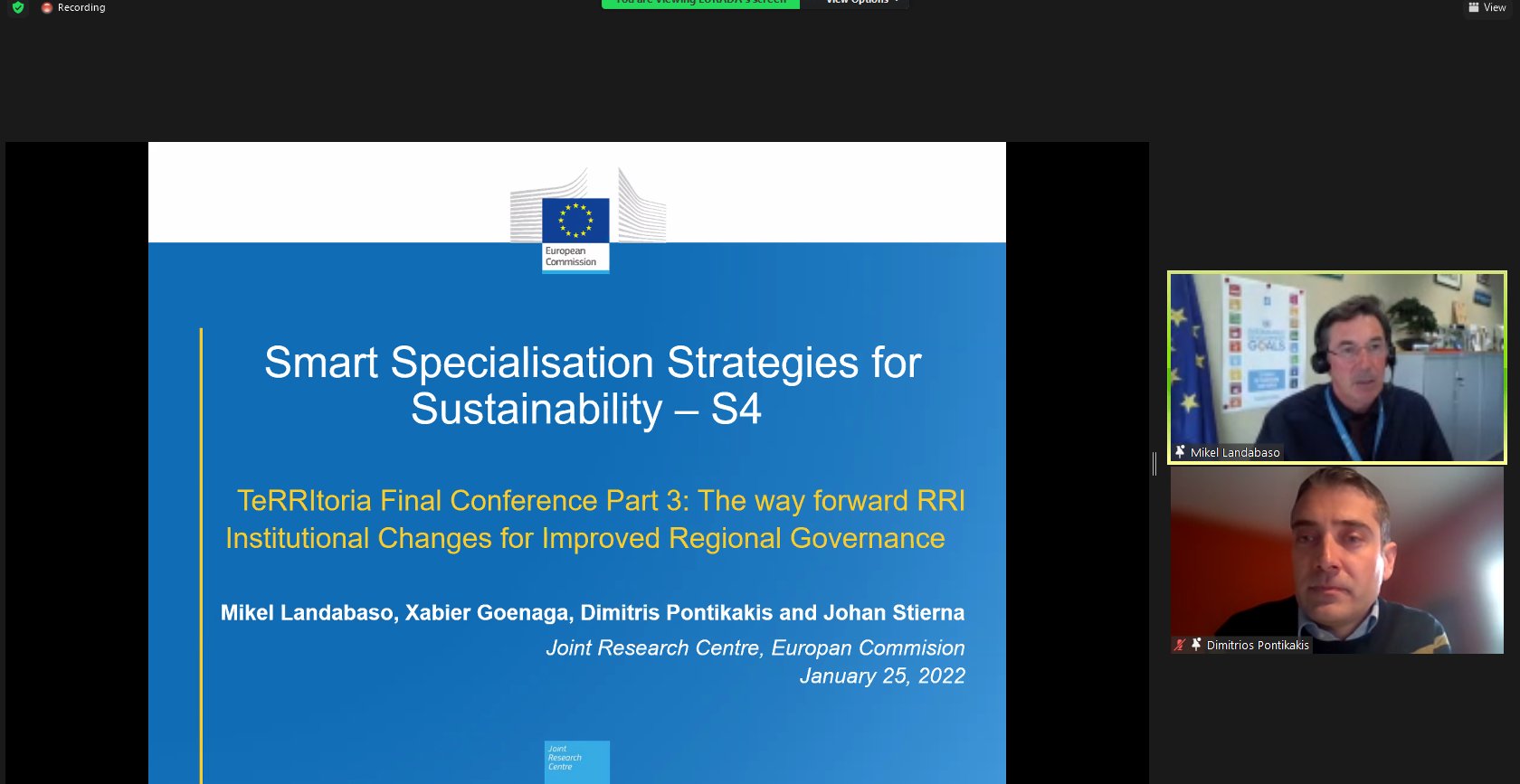#ResponsibleRegions: a monthly dialogue on S3 and RRI
Since November 2020, TeRRItoria has been carrying out a new initiative: #ResponsibleRegions. This is a series of monthly online events which deal with the concepts of Smart Specialisation Strategy (S3) and Responsible Research and Innovation (RRI). These are presented in the format of multi-person dialogues with a main speaker and two panellists, one from academia and one from the regional development field, as well as the option for audience involvement and questions. With these webinars, the TeRRItoria partners would like to strengthen the international exchanges between Regional Development Agencies (RDAs), regional governments, and/or local authorities in order to create the possibility for strong mutual learning. Additionally, the scope of these webinars is to raise awareness of and competence around S3 and RRI among participants. The target audience of these webinars are primarily regional economic practitioners and development agencies, who are enabled to discuss better strategies with SwafS-14 projects, alongside other RRI projects financed by Horizon 2020 and other associated interested parties.
Structure of the dialogues
Each dialogue is organised on the third Thursday of the month at 15:00 CET and lasts flexibly from 60 to 90 minutes and adheres to the following structure:
- An introduction of 5-10 minutes by Esteban Pelayo – Director of EURADA – explaining the purpose of the event
- A 15-25 minute slot for the main spaker
- A brief session of Q&A
- The point of view on the topic from two pannelists
- A final debate and opportunities on S3 and RRI.
Upper Austria’s #upperVISION2030 business and reserach strategy
For the first instalment of #ResponsibleRegions, the subject was the new Smart Specialisation Strategy (S3) of the Regional Development Agency of the region of Upper Austria, Business Upper Austria – OÖ Wirtschaftsagentur GmbH. Mr Klaus Oberreiter, responsible for policy & location strategy of Business Upper Austria, described how Upper Austria introduced its first “Strategic Programme” as far back as 1998. Since then, the region has progressed through 4 different such strategies before developing its newest and current one, #upperVISION2030. Klaus stressed that the agency tried to have a broad, bottom-up approach when making this S3.
One quite fundamentally new aspect of this Smart Specialisation Strategy was how they approached stakeholders (such as research institutions, companies, and universities). Mr Oberreiter stressed how they would previously always ask them what their agency should do based on their activity fields, often resulting in an idealistic wishlist. In contrast to that, when planning the latest S3, they instead asked the stakeholders what the stakeholders could do for the regions. In this way, they changed the mindset that education, industry, and government had had over the previous decades. Changing this was not easy, he stressed, but allowed for the Strategy to be approached in a more revealing way. Perhaps one of the most intriguing points highlighted in the presentation was about how Business Upper Austria undertakes regular discussion of the activities set out in the S3.
By clicking here, you can see a detailed summary of what was discussed during the event, and by clicking here you can watch the full event.
Responsible Innovation in regional policies and practices: a view from ERDF-founded territorial cooperation
On Thursday the 17th of December, TeRRItoria held the second dialogue of #ResponsibleRegions, The subject of the second instalement was “Responsible Innovation in regional policies and practices: a view from ERDF-funded territorial cooperation“. The main speaker was Giulia Bubbolini, head of EU and Public-Funded Projects at CISE – Centre for Innovation and Economic Development, Agency of the Chamber of Commerce of Romagna, Italy – who illustrate her experience in improving regional public policy by implementing RRI among SMEs. She is the project coordinator of two European projects: MARIE and ROSIE.
Interreg Europe MARIE is a project with 10 partners from 8 European regions. They work to maintain S3 policies. In their first 3 years, they developed action plans and now for 2 years they have to implement them. Meanwhile, Interreg Central Europe ROSIE worked on making SMEs familiar with Responsible Innovation. The kinds of lessons learned were then made available to policymakers, but the main focus for the project’s exploitation were SMEs. Ultimately, they trained over 300 SMEs, providing them with the tools to manage Responsible Innovation. They also had the chance to put into place 5 pilot actions involving around 50 SMEs.
Giulia Bubbolini stressed that regional operational plans exist to support innovation, and innovation happens only when companies bring it into the market. For this reason, they decided it was important to introduce companies to RRI and plant the seeds for future improved RRI-induced growth in them.
By clicking here, you can see a detailed summary of what was discussed during the event, while by clicking here you can enjoy the full event.
The Nordland case in SeeRRI: an approach to co-creating regional planning strategy
The first event organised by the TeRRItoria consortium in 2021 was the third dialogue of #ResponsibleRegion. On Thursday 21st January, Nhien Nguyen illustrated “The Nordland case in SeeRRI: an approach to co-creating regional planning strategy”.
She presented regional planning as a wicked problem, complex with no clear solution and “no right to be wrong” for the planner as the choices made for the regional planning will have consequences. Nhien pointed out that a mistake commonly made in regional planning is focussing on the best option available for the future, as in actual fact scenario planning is needed in order to develop a strategy that will remain viable in the event of any of the possible scenarios becoming reality. This can only be achieved through a co-creation process including Quadruple Helix stakeholders from the early stages by engaging them and taking account of their different views, knowledges, and interests on an issue that is important for all of them (in the case of Nordland, the issue of the region’s coast and the management thereof).
For her, the Nordland-SeeRRI case illustrates the first result of a co-creation process that forms a regional actor network and knowledge platform. The recipe for it would be a compelling mission, the right stakeholders, a creative process and the possibility to leverage all of it. She insisted that it can be transferred to other territories by adapting the territorial focus as was done in Catalonia and Lower Austria.
Our two panellists then reacted to the presentation of the Nordland case by presenting their own views and experiences on the matter. Our first pannelist, Tomas Gyulai of Darrinno (the Regional Development Agency of the South Great Plains in Hungary), presented different initiatives that his team is involved in, leading the way for transregional co-creation planning. It was also stressed that involving citizens is key in these types of projects. Alessandro Deserti, from his experience on co-creation for RRI, stressed that it is not enough do to problem setting from the beginning since stakeholders and their representatives change over time. It is thus important that they accompany the co-creation process over a longer period.
A detailed summary of what was discussed during the event can be read by clicking here. By clicking here you can enjoy the full event.





